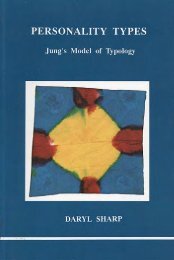Digesting Jung: Food for the Journey - Inner City Books
Digesting Jung: Food for the Journey - Inner City Books
Digesting Jung: Food for the Journey - Inner City Books
You also want an ePaper? Increase the reach of your titles
YUMPU automatically turns print PDFs into web optimized ePapers that Google loves.
15<br />
The Analytic Process<br />
As long as an analysis moves on <strong>the</strong> mental plane nothing happens,<br />
you can discuss whatever you please, it makes no difference,<br />
but when you strike against something below <strong>the</strong> surface, <strong>the</strong>n a<br />
thought comes up in <strong>the</strong> <strong>for</strong>m of an experience,<br />
and stands be<strong>for</strong>e you like an object . . . . Whenever you<br />
experience a thing that way, you know instantly that it is a fact. 45<br />
True healing does not happen in <strong>the</strong> head. It occurs through feelingtoned<br />
realizations in response to lived experience. That is why <strong>the</strong><br />
analytic process, when pursued on an intellectual level—and that<br />
includes most self-analysis—is sterile.<br />
Thoughts “in <strong>the</strong> <strong>for</strong>m of an experience” have a trans<strong>for</strong>ming effect<br />
because <strong>the</strong>y are numinous, overwhelming. They lead to a<br />
more balanced perspective: one is merely human—not entirely<br />
good (positive inflation), not entirely bad (negative inflation), but a<br />
homogenous amalgam of good and evil. The realization and acceptance<br />
of this is a mark of <strong>the</strong> integrated personality.<br />
The process of assimilating unconscious contents does not happen<br />
without work. It requires discipline and concentrated application,<br />
and a mind receptive to <strong>the</strong> numinous.<br />
<strong>Jung</strong> purposely did not develop a systematic <strong>the</strong>rapeutic method<br />
or technique, because he valued what happened in <strong>the</strong> individual<br />
encounter with patients above any <strong>the</strong>ories on how things “should”<br />
proceed. He writes:<br />
No programme can be <strong>for</strong>mulated <strong>for</strong> <strong>the</strong> technical application of<br />
psychoanalysis. . . . My only working rule is to conduct <strong>the</strong> analysis<br />
as a perfectly ordinary, sensible conversation, and to avoid all appearance<br />
of medical magic.<br />
45 The Visions Seminars, pp. 337f.<br />
60










